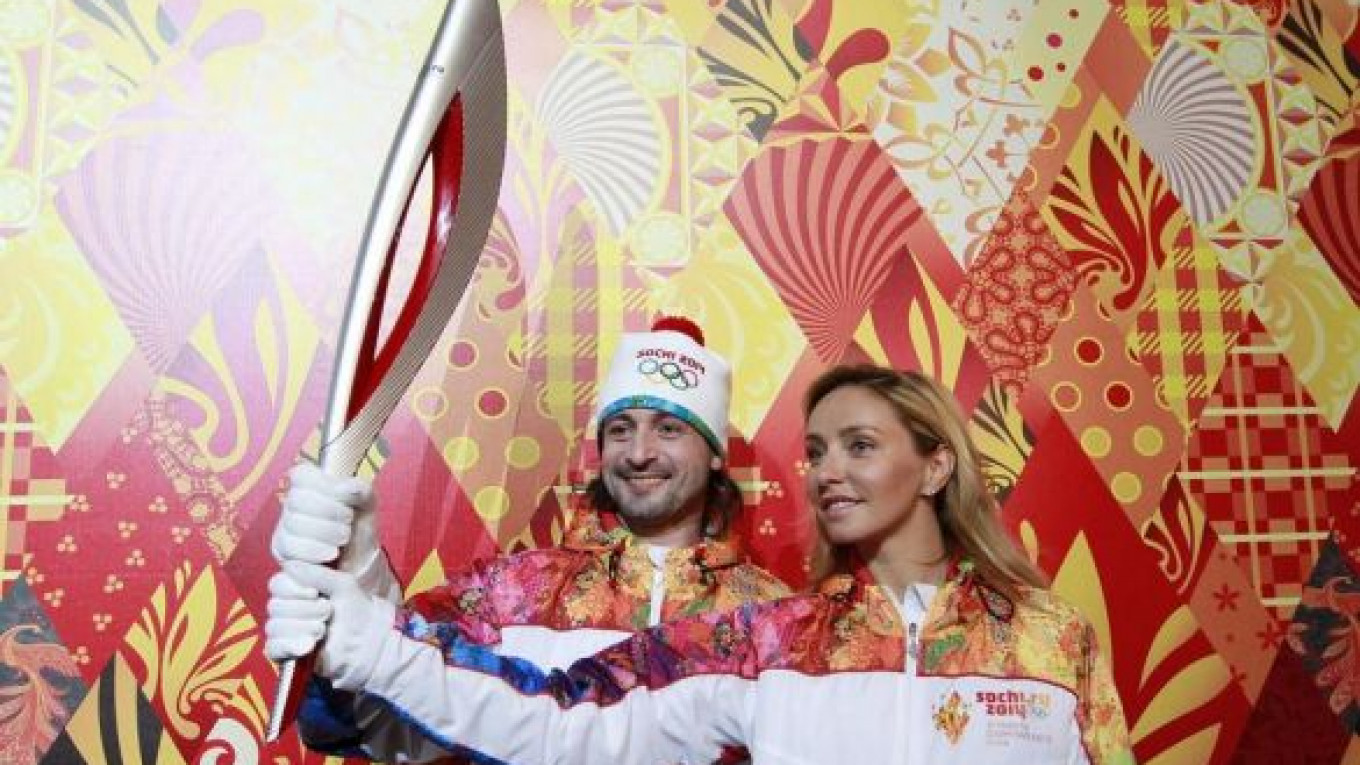Friday, Feb. 7., 7:00. Arrive at SVO. Check-in with no line, and security is faster than usual. Aeroflot employee tells me that Sochi flights take priority over others. She is correct, and we depart on time.
10:20. We land at Sochi's airport. There are more police and Olympic volunteers than arrivals.
10:40. Exit airport and met by two stray dogs. They are passive and offer a nice touch — far more reassuring than the police I see everywhere.
11:00. Take the new Siemens bullet train to the center of Sochi. On the train, a "comforting," soft-spoken announcement advises visitors to "be alert for terrorist attacks."
11:15. Train speeds along the coast. Looking out the window, I see an old, run down, lower-middle-class Black Sea resort with a rail line smack on the waterfront edge.
12:00. Arrive at Sochi station. A set of Olympic rings hang from the spruced-up neoclassical Soviet station.
12:20. Check in at hotel, which claims to be rated four stars but would barely make three in the real world. A sturdily built, middle-aged cleaning lady gives me an extra pillow because I speak Russian. My room overlooks an impressive, 28-story luxury hotel not yet open, one of several unfinished projects that I will see.
13:00. Walk the promenade toward Sochi port. Bosco Retail refurbished the once-derelict port structure. Their ubiquitous pastel design — not cheap — is everywhere. Great marketing.
15:00. The Olympic torch passes through an enthusiastic and mostly Russian crowd. In other Games, torch relays often look ridiculous, but Russia seemed to pull it off successfully — at least when the torch reached its final point in Sochi.
20:00. Opening ceremony starts with the Interior Ministry choir singing a wholly camp rendition of "Get Lucky" followed by Russian pop group t.A.T.u.
20:14. The big show begins. Mostly Russian crowd with fewer foreigners than other Games, but maybe they're disguised as Russians, given the U.S. State Department terrorism warnings. While nearly everyone is dressed in Bosco attire, I stick out like a sore thumb in a sport coat and turtleneck — although this was quite modno here a couple of years ago after Putin donned this combination.
Impressive technical show emphasizes Russia's contributions to literature, arts, science and sport. The worst chapters of Soviet history are airbrushed out, but that's normal. Home field advantage.
23:15. The torch is lit, and the crowd leaves enthused. Let the Games begin!
Saturday, Feb. 8, 13:30. Take the bullet train to the Olympic Park. Airport-style security is at the station rather than the venue itself. Volunteers manage it quickly and unobtrusively. I ask a police guard where the toilet is, and he walks me there, as if we were at the Ritz Carlton. He smiles and says pozhalusta. I wish I could bottle this Olympic spirit to keep forever.
15:00. Speed skating. Foreigners appear. The Dutch stick out of the crowd, dressed in orange. This is their sport. They sweep the medals, knocking the Russians, the early leaders, off the podium.
Russian spectators cheer their athletes robustly but are gracious in defeat. This is repeated at evening figure skating.
23:00. Inside the venues, the IOC runs events like clockwork. Exiting the park, the predominantly young volunteers are gaining in confidence.
In my two days here in Sochi, I am convinced that Russia is capable of pulling off an impressive Olympics, despite the bumpy road getting there.
Scott Antel is an attorney living in Russia for 20 years and has attended eight Olympic Games.
A Message from The Moscow Times:
Dear readers,
We are facing unprecedented challenges. Russia's Prosecutor General's Office has designated The Moscow Times as an "undesirable" organization, criminalizing our work and putting our staff at risk of prosecution. This follows our earlier unjust labeling as a "foreign agent."
These actions are direct attempts to silence independent journalism in Russia. The authorities claim our work "discredits the decisions of the Russian leadership." We see things differently: we strive to provide accurate, unbiased reporting on Russia.
We, the journalists of The Moscow Times, refuse to be silenced. But to continue our work, we need your help.
Your support, no matter how small, makes a world of difference. If you can, please support us monthly starting from just $2. It's quick to set up, and every contribution makes a significant impact.
By supporting The Moscow Times, you're defending open, independent journalism in the face of repression. Thank you for standing with us.
Remind me later.






